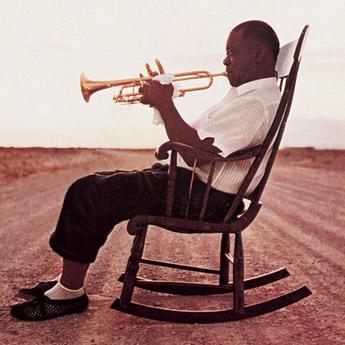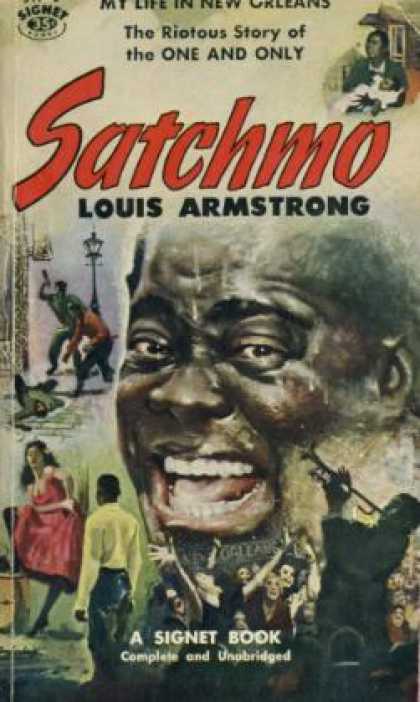Publishers Weekly just picked Pops: A Life of Louis Armstrong as one of the best books of 2009.
Says PW: “Teachout’s forceful reassertion of Louis Armstrong’s significance to 20th-century America is a model for writing serious biography about pop culture icons.”
To see the complete list, go here.
Archives for November 2, 2009
TT: Real and right
 Harcourt sent me the first finished copy of Pops: A Life of Louis Armstrong last Tuesday. It was an inordinately busy week crammed full of shows and deadlines, but I talked a sympathetic editor into giving me the rest of the day off and spent the afternoon and evening rereading the book. I spent a certain amount of time admiring the index, snuffling for typos–in vain, I’m glad to report–and confirming that the corrections I made on the galley proofs were incorporated into the final version. Mostly, though, I just flipped through the pages of Pops and marveled at how good it looked.
Harcourt sent me the first finished copy of Pops: A Life of Louis Armstrong last Tuesday. It was an inordinately busy week crammed full of shows and deadlines, but I talked a sympathetic editor into giving me the rest of the day off and spent the afternoon and evening rereading the book. I spent a certain amount of time admiring the index, snuffling for typos–in vain, I’m glad to report–and confirming that the corrections I made on the galley proofs were incorporated into the final version. Mostly, though, I just flipped through the pages of Pops and marveled at how good it looked.
Regular readers of this blog know that I believe the printed book to be well on its way to ultimate extinction. As I put it in a “Sightings” column written in 2006, a year before the introduction of the Kindle:
The printed book is a beautiful object, “elegant” in both the aesthetic and mathematical senses of the word, and its invention was a pivotal moment in the history of Western culture. But it is also a technology–a means, not an end. Like all technologies, it has a finite lifespan, and its time is almost up.
On the other hand, I have yet to buy a Kindle, and at the moment I have no plans to do so. This is partly because I prefer to wait until the kinks are ironed out (I’ve never been a truly early adopter) and partly because, like most middle-aged authors, I remain enamored of the sheer physicality of the old-fashioned printed book. I was intimately involved in the design of Pops–I even chose the typeface, as I have for all my books–and I think it might just be the best-looking book with which I’ve been involved. The dust jacket is gorgeous, the typography balanced and legible, the photos flawlessly reproduced, the paper pleasing to the touch. All these things add up to a total aesthetic experience that I find immensely gratifying. To put it another way, the printed version of Pops is both a vessel filled with interesting information and an objet d’art that is beautiful in its own right.
 So am I really a closet Luddite, a technological Moses who can’t bring himself to enter the promised land of the e-book? Maybe. Six years ago I declared myself to be “open, at least in theory, to the possibility of abandoning the book-as-art-object.” Now that technology has finally caught up with me, I find myself unexpectedly unwilling to put my money where my mouth is. Yet I believe no less firmly than ever that the printed book is a technology whose time has come and gone. Am I, then, a hypocrite? Or merely a middle-aged man who, like most middle-aged men, is reluctant to put aside the youthful things that remind me of myself when young?
So am I really a closet Luddite, a technological Moses who can’t bring himself to enter the promised land of the e-book? Maybe. Six years ago I declared myself to be “open, at least in theory, to the possibility of abandoning the book-as-art-object.” Now that technology has finally caught up with me, I find myself unexpectedly unwilling to put my money where my mouth is. Yet I believe no less firmly than ever that the printed book is a technology whose time has come and gone. Am I, then, a hypocrite? Or merely a middle-aged man who, like most middle-aged men, is reluctant to put aside the youthful things that remind me of myself when young?
I hasten to point out that I no longer own any long-playing records or cassettes, and that I spend more time listening to music on my MacBook and iPod than on my CD player. No doubt the time will also come when I spend more time reading books on a Kindle, or something like it, than reading the handsomely bound volumes shelved in my living room. Not for me the self-conscious posturing of those curmudgeonly poseurs who wail Change and decay in all around I see! at every opportunity. Nor would I surprised if my next book, whatever it happens to be and whenever it happens to come out, is published solely in electronic form–yet I can’t imagine that the thrill I get from downloading the first “copy” will be half so intense as the one I got last week when I held the first finished copy of Pops in my hands.
TT: Almanac
“One dreams of the goddess Fame and winds up with the bitch Publicity.”
Peter De Vries, The Mackerel Plaza
